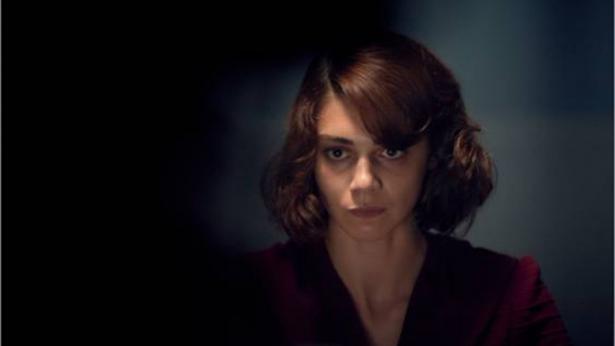This review contains spoilers.
Fiona ‘Feef’ Symonds (Emma Appleton), the upper middle class daughter of a Tory MP, is selfishly sorry that the WWII is over. War brought her an American lover and a chance at adventure; peace brings her a life mapped out - marriage, children, the corseting comforts of being one of the establishment. When offered the opportunity to protect her country from hidden enemies as a field agent working undercover at the Home Office, Feef takes it. “Thank God I met you,” she tells the US spy who recruits her. We’ll see.
In July 1945, Feef’s people’s establishment is beginning to feel less… established, a change demonstrated by the rainwater dripping from a chandelier onto the dining table in the family pile. Being sequestered for the war effort has left the property worn and damaged. The cheapest option, advises lawyer Hugh Fenton (Luke Treadaway), is demolition.
Fenton, a socialist, might well say that. His maiden speech to parliament after taking the Symonds’ ‘safe’ Tory seat for Labour is a wrecking ball that promises to smash social inequality. He tells the House that somebody (Feef) recently told him that it didn’t matter which party was in Number Ten. They’re in for a shock, he promises.
Or is it a threat. Traitors—created and written by Bash Doran under the working title of Jerusalem—is fraught with those. There are the Nazi officers (actually allied officers roleplaying) poised to cut off Feef’s fingers during her interrogation training, and there’s Rowe (Michael Stuhlbarg), the US handler who’ll do “whatever it takes” to run his Commie-surveillance mission. It’s a threat he makes good on when he murders Feef’s lover Peter, a compatriot standing in his way.
Traitors is a satisfyingly grown-up spy thriller. It’s confident enough to tell its political story bare of ‘alternate reality’ dressing, and to trace modern-day political parallels without chipping away at the reality of its period. Russian political influence on the West is a modern subject, yes, but it’s also a 1940s one and a 1920s one, and, hell, a 1720s one. Its characters’ politics, from Hugh’s passionate socialism to Feef’s sleepy conservatism, belongs to their age and ours. Lines like Feef’s off-hand “It doesn’t give me much faith in democracy. People don’t know what they need” could have been hammered for post-referendum-relevance, but aren't.
Traitors is also wise enough not to mistake dourness for gravity, and makes blessed room for moments of levity. The government official advising Feef on species of wood (“You’ve got to consider fungal decay. You have to.”) is a lark right out of an Alan Bennett monologue. Feef’s interrogation by Nazis turning out to be a training exercise is an entertaining surprise. Her college friend’s husband and his "highly intelligent" mother brings yet more smiles. Like Killing Eve before it, Traitors knows that comedy doesn’t have to undermine or dissolve thriller tension.
The cast is strong too. Appleton is captivating as the playful, impulsive Feef, an almost ironically detached young woman drawn to danger in the mode of a Kate Atkinson heroine. Next to Treadaway’s earnest Hugh, Feef’s privileged poise comes off as invitingly louche.
Appleton and Treadaway’s scenes together are engrossing, but the real draw will be Feef’s encounters with Keeley Hawes’ Home Office employee Priscilla Garrick, only glimpsed here in the quasi-comic interview scene with Fresh Meat and The A Word’s Greg McHugh. Boardwalk Empire’s Michael Stuhlberg is once again dangerous and captivating as Rowe.
Director Dearbhla Walsh and her team take the theme of post-WWII Britain being off-kilter literally. Traitors’ angles are tilted and high, creating the effect of instability. The country may have been flattened, but the shots are dynamic.
On top of all that is the spy fun: invisible ink, secret missions, glamorous gowns and assassins hiding behind bedroom curtains. Doran’s script weaves politics, history, laughs and espionage thrills into a satisfying first episode that bodes well for what’s to come.


Spread the word